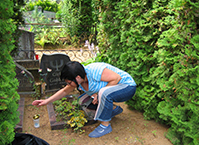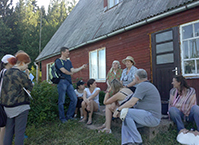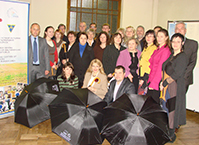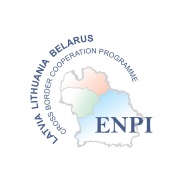About studies and proffesion
Categories: School, Helena Bilinska
Story-teller: “There were no schools, no schools were here. During the war there was such a village Bērzenieki, there was a Russian school, a small one, Russian school. I don’t know for how long, maybe, for just a couple of years. Then there, in Bērzgale village, there was a man in one house, he allotted one big room; that was the Latvian primary school. I went to that Latvian primary school, I was seven when I started school. I couldn’t, nobody could write, I knew nothing. My mother couldn’t write either. Prayers from the book, she said her prayers, the old woman.”
Interviewer: “By heart, most probably! She had learned them by heart, hadn’t she?”
Story-teller: “By heart. We studied in the Latgalian language from Form 1 to Form 4, I studied in Bērzgale. It was that way, not like you now, you have all the books. Those times paper was expensive, I think, we had some four exercise books, we had to use them the whole winter. One exercise book was for calculations, one – for writing, one – for calligraphy, I remember, there was such a prolonged pad for drawing. Then, to economize we had boards, small boards. We called them gripeles. Those slate-pencils (gripeles) were used to write!”
Interviewer: “Yes, yes, yes!”
Story-teller: “Have you heard of such a gripele [slate-pencil]?”
Interviewer: “We have, but tell us, how is it made, where did you get them?”
Story-teller: “Those were sort of pencils, they were thin, called gripelis. We wrote with that pencil on the board, the teacher had a look if it was correct and then we had to rewrite that in the exercise book. If it was wrong, it was wiped off, and we had to write it again, so that not to dirty the paper unnecessarily. If it was correct, then everything was rewritten in the exercise book. This is how we, how we learned. There was only one teacher for all the three forms. There was Form 1 sitting, there – the second, there – the third and such a place, such as our sofa, you see, thus we even… in the year eight I passed form the third to the fourth form. Thus we learned everything in Latgalian. But, when I left for Rogovka, then it was the Latvian language, then I studied the material of forms five and six. As we said, they taught us in the Čiuļi language [the Latvian language].
Interviewer: “They taught you in the Čiuļi language!”
Story-teller: “They taught us in the Čiuļi language. Yes. So, you see, we didn’t have to learn that much, and we finished school soon. Those people in the primary school were clever– they have finished six years. With the six-year education people worked in the councils of civil parishes, offices, etc. there was no higher education. Teachers graduated from Rēzekne institute, they had to study four years and became teachers. But now, those teachers who have started working, they had to continue studies in some higher education establishment to work at school. But in my times, it was enough with that, with, with Rēzekne institute. That is what our education was.
Interviewer: “How many years did you study? How many forms did you finish?”
Story-teller: “I finished the primary school, it was six-year education.”
Interviewer: “Six, right?”
Story-teller: “In the primary school we all were well-educated people.”
Interviewer: “Did you do any devilry at school; were you up to some mischief?”
Story-teller: “I don’t know, I was rather timid, I was small when I started school, I was only seven. When I came here, to Rogovka, I was called little, my maiden surname was Dranka, everybody named me little Dranka, little Dranka. But in my class there were grown-up young men who were already attending dancing parties, there were no schools. They had recently come back from the army. When I got married, I though, that that schoolboy was five year older than me, but we were in one class, I mean the one whom I married, my husband. He was five years older, but we were in one form. So, I know that he had come to Form six from the army. People were eager to learn, but there were no schools, no schools, you see.”
Interviewer: “But where did you work during your life, did you work anywhere or what did you do?”
Story-teller: “I didn’t continue to study anywhere. I went, for two or three winters, my father had let me go to Rēzekne to acquire the dressmaker’s trade. I came back for summers, but in winter, autumn I went to Rēzekne to study, thus, I left. There was a private dressmaker, a tailor, she made clothes for the whole Rēzekne intelligentsia, she made beautiful dresses, and suits as well, everything. And so, I acquired that trade of a dressmaker, then I could stay in the countryside, there were no such dressmakers in the countryside who could make such clothes. I made various fashionable beautiful dresses, I made them for all the teachers.
Interviewer: “My grandmother also was a dressmaker!”
Story-teller: “Later, you see, when we moved to live in Rundelīte, the life wasn’t very good. There were no dressmakers at all, and it was possible to make a lot of money, I didn’t have to work anywhere else.”
Images
Audio
Researcher: Dr. philol. Jeļena Koroļova, Daugavpils Universitāte











